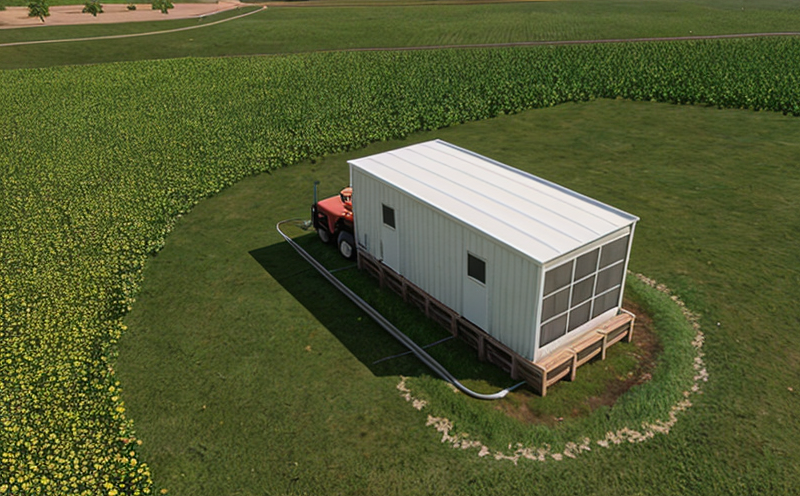EN 60068-2-78 Mold Growth Resistance Testing
The EN 60068-2-78 standard specifies procedures to determine the resistance of materials and products to mold growth under controlled environmental conditions. This test is crucial for ensuring that electrical and electronic equipment, as well as other components used in railway and transportation systems, can withstand exposure to moist environments without compromising their functionality or safety.
The process involves exposing specimens to a high-humidity environment followed by a temperature cycle designed to simulate the natural conditions under which mold growth typically occurs. The duration of this cycle is critical and must be tailored based on the specific material being tested. For instance, some materials may show signs of mold growth after just 3 days, while others might require up to 21 days.
Before initiating the test, specimens are prepared according to prescribed standards. This includes cleaning the samples thoroughly to ensure no pre-existing molds or debris interfere with the results. The test chamber is then calibrated and maintained at precise temperature and humidity levels as defined in the standard.
The apparatus used for this testing typically consists of a controlled-environment chamber equipped with sensors capable of monitoring both temperature and relative humidity accurately within narrow tolerances. Humidity levels range from 95%RH to 100%, while temperatures vary between -20°C and +85°C depending on the specific requirements outlined in EN 60068-2-78.
Once the specimens have been exposed to these conditions for the specified time period, they are examined visually for signs of mold growth. Any visible fungal colonies are recorded and documented as part of the final report. The results provide valuable insights into how well different materials perform in humid environments, which is essential information when designing products intended for use in railway or transportation settings where exposure to moisture cannot be avoided.
It's important to note that this testing method does not guarantee protection against mold growth but rather provides a reliable measure of material resistance. By adhering strictly to the procedures outlined in EN 60068-2-78, laboratories can ensure consistent and accurate results across multiple trials.
Industry Applications
| Application | Description |
|---|---|
| Railway Systems | Evaluating the durability of electrical components used in trains subjected to frequent humidity fluctuations. |
| Transportation Electronics | Determining the reliability of embedded electronic devices exposed to harsh environmental conditions during transit. |
| Metrology Equipment | Assessing the longevity of precision instruments operating in humid environments like underground stations or tunnels. |
| Automotive Components | Testing the resilience of exterior parts such as headlights, mirrors, and body panels against mold buildup caused by rainwater condensation. |
| Aviation Parts | Ensuring that aircraft components made from composite materials remain free from mold growth even in high-humidity storage facilities. |
| Marine Electronics | Verifying the integrity of onboard navigation systems and communication devices exposed to saltwater spray and humidity. |
| Construction Materials | Evaluating the resistance of waterproofing membranes against mold growth in areas prone to frequent rain or condensation. |
| Tourism Equipment | Assessing the robustness of outdoor gear like umbrellas and tents under prolonged exposure to damp conditions. |
Customer Impact and Satisfaction
By leveraging our expertise in EN 60068-2-78 mold growth resistance testing, customers benefit from enhanced product performance and reliability. Our rigorous testing ensures that manufacturers can confidently market their products as robust enough to handle various environmental challenges without compromising safety or functionality.
The detailed reports generated after each test provide comprehensive data that helps guide design improvements aimed at reducing future failures due to mold contamination. This not only enhances customer satisfaction but also fosters long-term partnerships built on trust and reliability.
Our commitment extends beyond just conducting tests; we offer valuable insights into potential areas for improvement based on our findings during the testing process. These recommendations assist clients in optimizing their manufacturing processes, leading to better quality products that meet strict regulatory standards.
In summary, by utilizing our EN 60068-2-78 mold growth resistance testing services, customers achieve peace of mind knowing their products are thoroughly evaluated against industry best practices. This results in higher customer satisfaction and increased market competitiveness through superior product offerings.
International Acceptance and Recognition
The EN 60068-2-78 standard is widely recognized globally for its stringent requirements regarding mold growth resistance testing. Its acceptance by regulatory bodies worldwide ensures that any product tested according to this standard meets internationally accepted benchmarks.
Countries including the United Kingdom, Germany, France, Italy, and others have incorporated EN 60068-2-78 into their national standards or guidelines for evaluating electrical and electronic products. This broad international recognition enhances confidence in the results derived from our laboratory tests, making it easier for manufacturers to comply with global regulations.
Furthermore, adherence to this standard is often seen as a mark of quality assurance that adds value to both domestic and export markets. It demonstrates a commitment to producing high-quality products capable of performing reliably under challenging environmental conditions.





